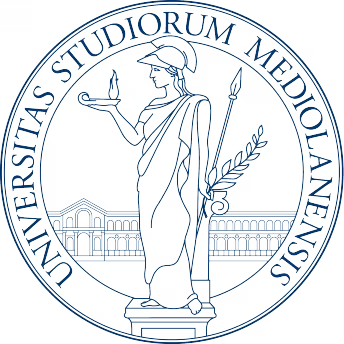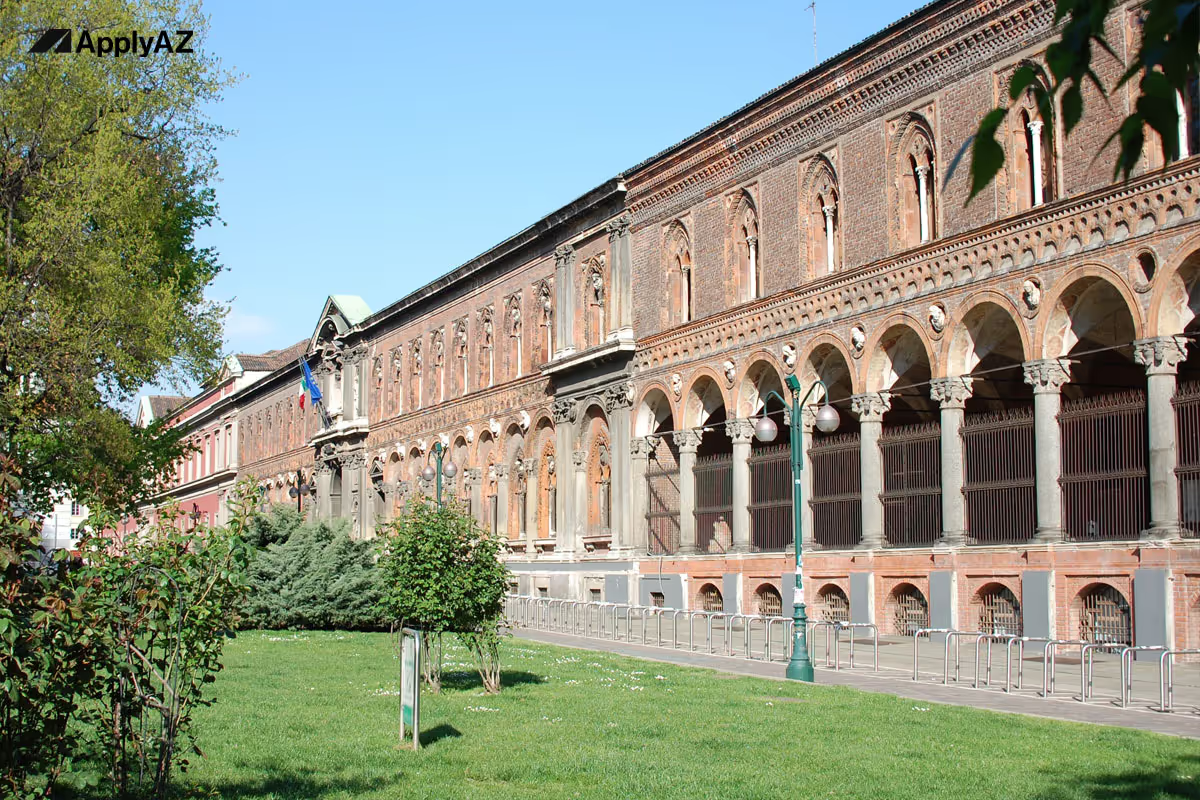Heading
Heading








University of Milan
English‑taught programs in Italy: breadth and quality
Founded in 1924, the University of Milan is a flagship among public Italian universities. It offers more than 15 full degrees entirely in English across life sciences, data science, economics, law, and the humanities. Small‑group seminars, modern laboratories, and research‑led teaching earn the university a consistent place in global top‑200 rankings for medicine, biology, and physics. Academic life blends lectures with project work and Erasmus+ exchanges, giving you both depth and international exposure.
Life in Milan: culture, costs, connections
Milan pairs Renaissance architecture with Europe’s fastest‑growing innovation district. Four metro lines, trams, and regional trains keep average commutes under 35 minutes, while student passes cut transport costs by half. Cafés stay open late for study sessions; world‑class music, design fairs, and football derbies fill weekends. Rents start around €400 per month in shared flats—pricey for Italy, but offset by campus dining at €4 per meal and the chance to share expenses with classmates.
Funding advantages: DSU grant and other support
As a state institution, Milan charges income‑linked tuition that ranges from €156 to roughly €3 000 per year. International students can apply for the DSU grant, which may waive tuition entirely and add a €7 000 living allowance, residence‑hall place, and meal vouchers. Merit scholarships reward top GPAs, and research assistant roles provide paid experience. With these tools, many graduates finish their master’s with little or no debt, mirroring the affordability of tuition‑free universities Italy promotes.
Career gateways in a global city
Milan is home to Italy’s stock exchange and to headquarters of companies such as IBM, Luxottica, and Nestlé. University partnerships cover more than 4 000 firms, feeding internships in finance, biotech, fashion tech, and AI start‑ups. Career Services run résumé labs, mock interviews, and on‑campus job fairs; 87 % of international graduates secure work or PhD places within seven months. Language tandems, alumni mentoring, and professional certification courses (Prince2, CFA Level I, Lean Six Sigma) further boost employability.
Five key takeaways
- Wide portfolio of English degrees backed by strong research.
- Dynamic metropolitan lifestyle with rich art and sport.
- Income‑based fees plus DSU grant make study highly affordable.
- Direct pipelines to internships and high‑growth careers.
- Supportive campus: libraries until midnight, 100+ clubs, free fitness classes.
In two minutes we’ll confirm whether you meet the basic entry rules for tuition‑free, English‑taught degrees in Italy. We’ll then quickly see if we still have space for you this month. If so, you’ll get a personalised offer. Accept it, and our experts hand‑craft a shortlist of majors that fit your grades, goals, and career plans. Upload your documents once; we submit every university and scholarship application, line up multiple admission letters, and guide you through the visa process—backed by our admission‑and‑scholarship guarantee.
Environmental Change and Global Sustainability – LM‑75
Choosing to study in Italy in English is a smart move if you want high‑quality teaching, diverse classmates, and low fees. In the first lectures you will see how English‑taught programs in Italy bring together students from five continents, how public Italian universities keep tuition modest—often reaching the level of tuition‑free universities Italy supports—and how scholarships such as the DSU grant cover living costs. The Environmental Change and Global Sustainability master’s (LM‑75) at University of Milan (Università degli Studi di Milano) blends earth science, policy, and social justice, giving you the tools to tackle the climate crisis and lead sustainable change.
The Appeal of English‑taught programs in Italy
An English‑taught degree in Italy delivers the best of both worlds. You earn a respected European qualification without delaying your studies for language courses, yet you live in a country rich in culture, research heritage, and green innovation.
- Global perspective: Lecturers link Mediterranean climate history to present‑day UN climate talks.
- Affordability: State‑regulated fees combined with the DSU grant mean many students graduate debt‑free.
- Career links: Professors collaborate with EU research networks and international NGOs, opening doors for internships.
- Cultural richness: Workshops might reference Roman water systems one week and modern agro‑ecology the next, showing continuity and change across centuries.
Study in Italy in English: Programme Overview
The LM‑75 degree explores how environmental processes, social systems, and economic forces interact. Over two years you will:
- Diagnose change – measure land‑use shifts, biodiversity loss, and climate trends.
- Design solutions – craft policies, market tools, and community plans for sustainability.
- Drive action – communicate science to policymakers, businesses, and citizens.
Lectures, labs, and field trips merge theory with practice—so you leave able to model carbon cycles, evaluate adaptation plans, and lead multi‑stakeholder workshops.
Year‑by‑Year Curriculum
Year 1: Foundations and Methods
- Global Climate Systems – feedback loops, tipping points, and scenario modelling.
- Sustainability Economics – cost‑benefit analysis, circular economy principles, and green accounts.
- Quantitative Research Methods – statistics, GIS (geographic information systems), and remote sensing.
- Environmental Law and Governance – multilateral agreements, national policies, and compliance tools.
- Social Dimensions of Change – environmental justice, indigenous knowledge, and behavioural drivers.
Year 2: Integration and Application
- Land, Water, and Energy Planning – integrated resource management, renewable transitions, and smart grids.
- Biodiversity and Ecosystem Services – valuation, restoration strategies, and nature‑based solutions.
- Climate Finance and Green Markets – carbon pricing, sustainable bonds, and ESG (environmental, social, governance) metrics.
- Urban Resilience Studio – collaborative design of climate‑resilient cities.
- Electives – choose food systems, disaster risk, or marine policy.
- Thesis or Internship – an original project often co‑supervised by UN agencies, EU bodies, or private companies.
Tuition‑free universities Italy: Funding Your Degree
Studying abroad often costs less in Italy than in many Anglophone countries. Public fees are already low, and several funding streams reduce them further.
- DSU grant: Based on family income, this flagship support can waive fees, offer housing, and provide meal vouchers.
- Merit scholarships: Top applicants may receive extra stipends for research or mobility.
- Erasmus+ mobility: Many students spend a funded semester in another EU country.
- Part‑time jobs: Student visas allow up to 20 hours a week; the university careers office lists roles relevant to sustainability skills.
Careful planning with ApplyAZ ensures you hit deadlines and present financial documents correctly, maximising your chances of full support.
Public Italian universities: Academic Strength and Network
The University of Milan belongs to Italy’s leading public institutions. What does that mean for you?
- Research power: Faculty win Horizon Europe grants on topics like climate services and circular bio‑economy.
- Modern facilities: High‑performance computing for climate projections, environmental chemistry labs, and a GIS suite.
- Industry ties: Partnerships with renewable firms, regional authorities, and agro‑ecology cooperatives provide live case studies and data.
- Vibrant community: Sustainability clubs, Green Weeks, and citizen‑science events turn campus into a living lab.
Graduating from a public Italian university gives you a degree aligned with the Bologna Process, recognised across Europe and beyond.
Learning Approach: Data, Dialogue, Action
- Interactive lectures use real‑time polling and breakout debates.
- Field excursions visit protected wetlands, solar farms, and recycling plants, linking observation to policy.
- Simulation games place you in COP negotiations or water‑conflict mediations, sharpening diplomacy and systems thinking.
- Coding labs teach Python or R for analysing big climate datasets and economic indicators.
- Stakeholder panels bring NGOs, entrepreneurs, and city planners into class, letting you test project ideas on real decision‑makers.
Core Competencies You Will Gain
- Systems analysis – integrate climate, ecological, and socio‑economic data.
- Policy evaluation – assess effectiveness, equity, and feasibility of adaptation and mitigation measures.
- Technical communication – translate complex findings into memos, infographics, and briefing notes.
- Leadership and facilitation – guide workshops with scientists, citizens, and officials.
- Ethical reasoning – balance urgency, justice, and practicality in sustainability decisions.
Career Paths After Graduation
International organisations
- Climate adaptation officer at UN agencies.
- Sustainability analyst at the World Bank or regional development banks.
- Policy advisor in EU directorates on environment or energy.
Government and local authorities
- Environmental planner in regional ministries.
- Climate‑risk coordinator for city councils.
- Sustainability manager in public utilities.
Private sector and consulting
- ESG strategist for multinational corporations.
- Carbon market specialist in finance firms.
- Consultant on eco‑innovation and resilience projects.
NGOs and civil society
- Programme manager for climate education.
- Campaign researcher on biodiversity conservation.
- Community organiser for just‑transition initiatives.
Research and academia
- PhD candidate in sustainability science.
- Data scientist at environmental think tanks.
- Lecturer in climate policy and governance.
Ready for this programme?
If you qualify and we still have a spot this month, we’ll reserve your place with ApplyAZ. Our team will tailor a set of best-fit majors—including this course—and handle every form and deadline for you. One upload, many applications, guaranteed offers, DSU grant support, and visa coaching: that’s the ApplyAZ promise. Start now and secure your spot before this month’s intake fills up.

They Began right where you are










